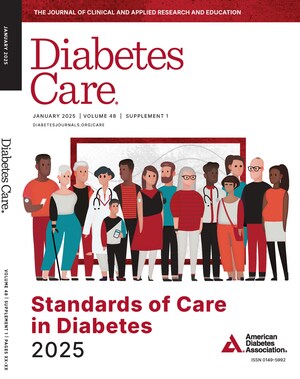SAN FRANCISCO, June 10, 2019 /PRNewswire/ -- In an analysis of the AWARD-7 study, people with type 2 diabetes (T2D) and moderate-to-severe chronic kidney disease (CKD) who took 1.5 mg of dulaglutide once weekly had a reduction of clinical events associated with end-stage kidney disease (ESKD) including dialysis and with a kidney transplant, and a slower rate of kidney function decline compared to people who used insulin or a lower dose of dulaglutide. The study is an abstract titled "Chronic Kidney Disease (CKD) Outcomes with Dulaglutide (DU) Versus Insulin Glargine (IG) in Type 2 Diabetes (T2D) and Moderate-to-Severe CKD by Albuminuria Status: AWARD-7," presented today at the American Diabetes Association's® (ADA's) 79th Scientific Sessions® at the Moscone Convention Center in San Francisco.
Because many medications used for the treatment of diabetes are filtered by the kidneys, treatment of kidney disease is challenging. Clinical trials initially designed to assess cardiovascular (CV) safety of glucagon-like-peptide-1 (GLP-1) receptor agonists in T2D have shown a reduced risk of developing albuminuria, and a slower rate of losing kidney function, mainly in patients without chronic kidney disease.
The AWARD-7 study was an international trial conducted at 99 sites in nine countries from 2012 to 2015. The 577 participants were adults with T2D and moderate-to-severe chronic kidney disease (stages 3–4) with A1C from 7.5–10.5%. The participants were randomly assigned to one of three groups: 193 received 1.5 mg of dulaglutide; 190 received 0.75 mg of dulaglutide, and 194 received insulin glargine.
After one year, results indicated a benefit to kidney function in the 1.5 mg dulaglutide group, and equivalent control of blood glucose levels between the dulaglutide and insulin treatment groups. Specifically, use of 1.5 mg weekly of dulaglutide was associated with a lower rate of CKD outcomes, including eGFR decline ≥40% or reduction of end-stage renal disease (ESRD), compared to treatment with insulin. Blood pressure control and the use of anti-hypertensive medicines, such as renin-angiotensin system inhibitors that protect the kidney, were also similar between groups. Rates of hypoglycemia reactions were significantly lower with dulaglutide versus insulin treatment. Additionally, treatment with dulaglutide resulted in weight loss, while insulin produced weight gain.
In this pre-specified exploratory analysis of AWARD-7, rates of clinical events of end-stage kidney disease (ESKD) requiring dialysis or kidney transplant and 40% eGFR decline (a proxy for ESKD) were compared between the dulaglutide and insulin treatment groups. Data indicated the risk of ESKD events and ≥40% eGFR decline was reduced by more than half for the dulaglutide group compared to the insulin treatment group. Further, the benefits of dulaglutide on ESKD and ≥40% eGFR decline were seen mainly in study participants with high levels of albuminuria.
"These results from AWARD-7 were particularly striking because of the marked reduction in clinical events with dulaglutide treatment among participants with moderate-to-severe chronic kidney disease who are already receiving the current standard-of-care (renin-angiotensin system inhibitors)," said lead investigator Katherine R. Tuttle, MD, FASN, FACP, FNKF, executive director for research at Providence Health Care, co-principal investigator of the Institute of Translational Health Sciences, and professor of medicine at the Kidney Research Institute and the University of Washington. "Until now, very few treatments have been shown to reduce the risk of end-stage-kidney disease and show an up to 40% eGFR decline at more advanced stages of chronic kidney disease. It is encouraging to see that newer glucose-lowering treatments, such as dulaglutide, protect the kidneys and may prevent serious complications even in individuals who are at stage 3 or 4 chronic kidney disease."
The abstract of the study can be accessed here. To speak with Dr. Tuttle, please contact the ADA Press Office on-site at San Francisco's Moscone Convention Center on June 7-11, by phone at 415-978-3606 or by email at [email protected].
The American Diabetes Association's 79th Scientific Sessions, the world's largest scientific meeting focused on diabetes research, prevention and care, is being held June 7-11, 2019, at the Moscone Center in San Francisco, California. Nearly 15,000 leading physicians, scientists, health care professionals and industry representatives from around the world are convened at the Scientific Sessions to unveil cutting-edge research, treatment recommendations and advances toward a cure for diabetes. During the five-day meeting, attendees will receive exclusive access to more than 850 presentations and 2,000 original research presentations, participate in provocative and engaging exchanges with leading diabetes experts, and can earn Continuing Medical Education (CME) or Continuing Education (CE) credits for educational sessions. The program is grouped into eight thematic areas: Acute and Chronic Complications; Behavioral Medicine, Clinical Nutrition, Education and Exercise; Clinical Diabetes/Therapeutics; Epidemiology/Genetics; Immunology/Transplantation; Insulin Action/Molecular Metabolism; Integrated Physiology/Obesity; and Islet Biology/Insulin Secretion. Gretchen Youssef, MS, RDN, CDE, President of Health Care and Education, delivered her address, "It's All About Access!," on Saturday, June 8, and Louis H. Philipson, MD, PhD, FACP, President of Medicine and Science, presented his lecture, "Precision Medicine—Addressing the Many Faces of Diabetes," on Sunday, June 9. Join the Scientific Sessions conversation on social media using #ADA2019.
About the American Diabetes Association
Every day more than 4,000 people are newly diagnosed with diabetes in America. Nearly 115 million Americans have diabetes or prediabetes and are striving to manage their lives while living with the disease. The American Diabetes Association (ADA) is the nation's leading voluntary health organization fighting to bend the curve on the diabetes epidemic and help people living with diabetes thrive. For nearly 80 years the ADA has been driving discovery and research to treat, manage and prevent diabetes, while working relentlessly for a cure. We help people with diabetes thrive by fighting for their rights and developing programs, advocacy and education designed to improve their quality of life. Diabetes has brought us together. What we do next will make us Connected for Life. To learn more or to get involved, visit us at diabetes.org or call 1-800-DIABETES (1-800-342-2383). Information is available in English and Spanish. Join the fight with us on Facebook (American Diabetes Association), Twitter (@AmDiabetesAssn) and Instagram (@AmDiabetesAssn).
Contact:
Michelle Kirkwood
(703) 299-2053
[email protected]
SOURCE American Diabetes Association

Related Links
WANT YOUR COMPANY'S NEWS FEATURED ON PRNEWSWIRE.COM?
Newsrooms &
Influencers
Digital Media
Outlets
Journalists
Opted In






Share this article